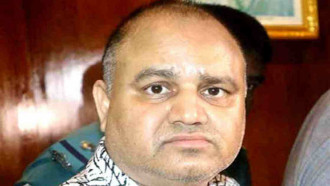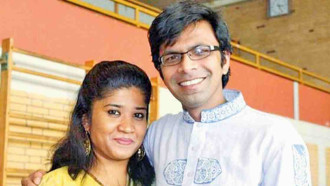Mufti Hannan to hang after president rejects pleas

Dhaka: Harkat-ul-Jihad (Huji) chief Mufti Abdul Hannan, who was condemned to death in a case filed over the grenade attack on ex-British envoy Anwar Choudhury in 2004, has lost his last hope of avoiding the death penalty after President Abdul Hamid rejected a mercy plea, an official said Sunday.
The High Court last month upheld a 2008 death sentence on Mufti Abdul Hannan and two associates for an attack on a shrine that left three people dead and injured the British high commissioner at the time.
Last month death-row convict, Huji chief Mufti Abdul Hannan and his associates—Delwar Alias Ripon and Sharif Shahedul Alam alias Bipul—wrote to President Abdul Hamid seeking clemency.
‘But the president has rejected all three mercy petitions,’ said his press secretary Joynal Abedin.
Jail authorities would now go ahead with the executions, said deputy inspector general of prisons Touhidul Islam.
Authorities have not announced a date but the executions are expected sometime this month.
On 7 December, 2016, a SC bench, headed by Chief Justice SK Sinha, upheld the death penalty of the three in the case rejecting appeals filed by the Huji chief and Bipul challenging the High Court verdict that had upheld their death sentence awarded by the tribunal.
On 11 February, 2016, a High Court bench comprising Justice M Enayetur Rahim and Justice Amir Hossain delivered the verdict upholding the death sentence of the three.
In 2004, the then British High Commissioner Anwar Choudhury came under a grenade attack while coming out of Hazrat Shahjalal’s shrine in his hometown Sylhet.
The envoy and 40 employees of the Sylhet district administration were injured in the attack.
Assistant sub-inspector Kamal Uddin died on the spot, while two constables — Rubel Ahmed and Habil Miah — succumbed to their injuries in a hospital.
Hannan headed the Harkat-ul Jihad Al Islami (HuJI) group. The attack on the British ambassador in 2004 was among the most high-profile of a series of assaults by the group across Bangladesh in the late 1990s and early 2000s.
The decision to reject clemency comes just weeks after militants attempted to free Hannan by hurling bombs at police vans as police transferred him between prisons.
By the time Hannan was arrested in late 2005 more than 100 people had been killed in attacks by HuJI on a church, secular gatherings and mosques used by Islam’s minority sects.
Bangladesh has suffered a spate of attacks on secular activists, foreigners and religious minorities in recent years.
Al-Qaeda and the Islamic State group have claimed responsibility in some cases but Prime Minister Sheikh Hasina’s secular government has pinned the blame on local outfits.
There has been a resurgence of Islamist extremist attacks in recent weeks, with at least three being claimed by IS.
The fatalities included the head of intelligence of an elite security force tasked with tacking Islamist militancy across the Muslim-majority country.
Police and army commandos have arrested scores of suspected extremists and killed more than 60 people since an attack on a Dhaka cafe last year that left 22 dead.

 AFP
AFP




